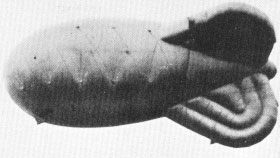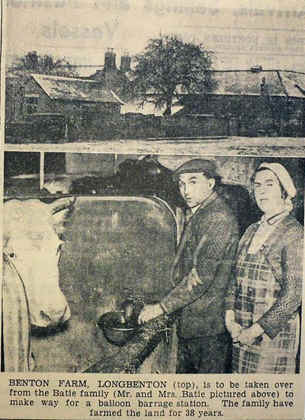 Click for Site Directory
Click for Site Directory
The Batie Family of Longbenton

Hugh Batie, age 42, and Edith Batie, age 37, were dairy farming at Long Benton Farm, they had farmed there since 1921 and had a thriving business.
One day in 1938, Hugh Batie was puzzled to see several men walking around one of his pasture fields.
He went down to confront them and was shocked to learn that they were surveyors and that the were surveying the farm as it had been chosen
as the site for a future Balloon Barrage Station.
In January 1939 the Batie family were told that the Air Ministry wanted to take over 86 acres and the various farm buildings.
From a farming business point of view this was disastrous as a dairy farm needed as much acreage as it could get to maintain milk production and
breeding of cows.
The land is the vicinity of Benton golf course near the Longbenton district boundary.
The advantage of this land from a military perspective was that it had an excellent main road approach to it.
The Batie family were like so many others who were farming and now subject to compulsory purchase of their land for military use.
They were left with no choice but to accept their fate and to take whatever compensation the Air Ministry was prepared to offer.
It meant that they could not survive in the dairy industry without the farm buildings and their usual acreage.
Even as contractors were driving wooden pegs into the ground to set out the buildings the Batie family asked Miss Irene Ward, M.P. for Wallsend,
to take up the case and see if there was anything that could be done.
A valuer from the Air Ministry was to meet with the Batie family’s agent to agree on compensation.
They were faced with no choice other than to let the farm go and have an auction
to sell off the remainder and look for a new farm.
The M.P. told the press, “So long as I am Member for Wallsend, no Government department shall treat constituents of mine this way without
something being done about it.” She had a meeting at the Air Ministry in London. “I made it clear that private individuals must be treated with courtesy by
Government departments, and that their officials must act in accordance with the regulations governing the acquisition of land. The Ministe
will convey his regrets at the action taken by his department.
Careful examination of the matter has shown that it will not be possible, as had been hoped, to save the farmhouse and buildings which would
have enabled Messrs Batie to continue to farm over 200 acres of land not required by the Ministry.
She added, “It is quite clear that on strategic grounds the farm Is the only possible site,” said Miss Ward, “but I have assured Messrs Batie that
I will do everything in my power to see that they are adequately compensated for
this sacrifice made in the national interest.”
In March 1939 it was reported that Longbenton Balloon Barrage station should be completed by August.
The site covered about 86 acres and there will about 219 officers and men to look after the equipment.
The buildings will include transport sheds, training rooms, workshops, quarters
for the
changing rooms, etc. All the training will be carried out at Longbenton and in the event war the barrage will be ready to spread
its encircling defences round the city.
On 2nd May 1939 the surplus land at Benton Farm, Longbenton, was sold by auction to a neighbouring farmer.
Hugh Batie and his wife Edith moved out and took over the tenancy of Newton
Garth Farm, Boldon Colliery.
In June 1939 the press reported on the near completion of the Newcastle (No. 15) Balloon Centre, at Longbenton.
There were carefully constructed concrete roads, specially leveled playing fields, and countless buildings equipped with central-heating,
and with main drainage and electric light and water laid on.
The move and upheaval took it’s toll on the Batie family and in November 1939 it was reported that Hugh had died quite suddenly.
His family claimed that he had died from a broken heart.
Peter Garwood 2024